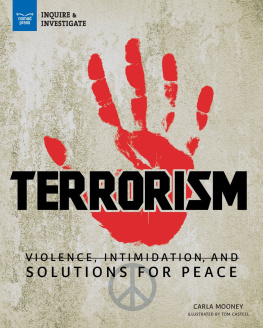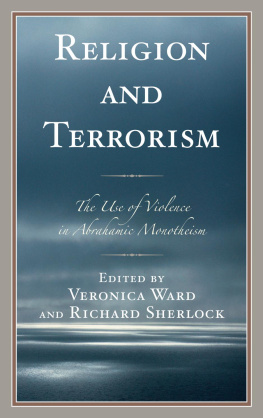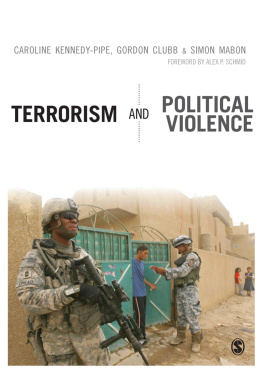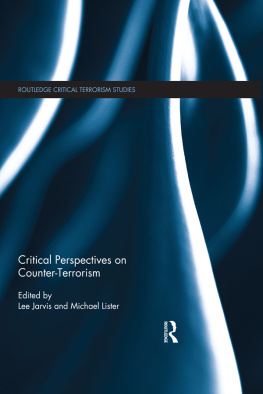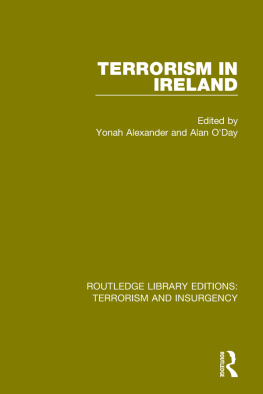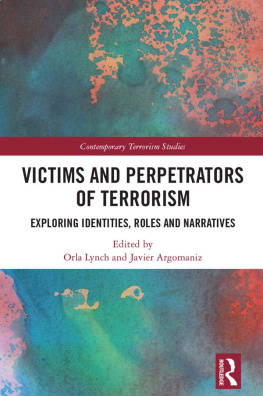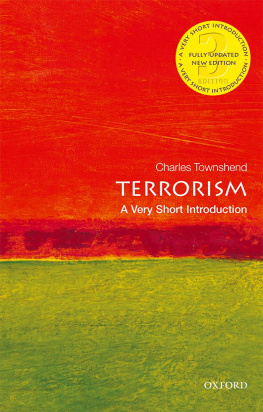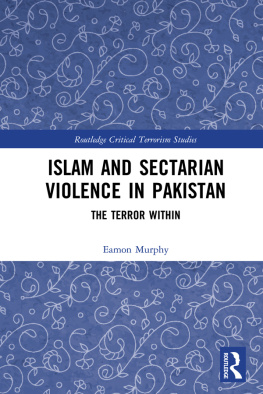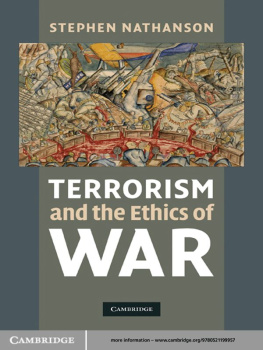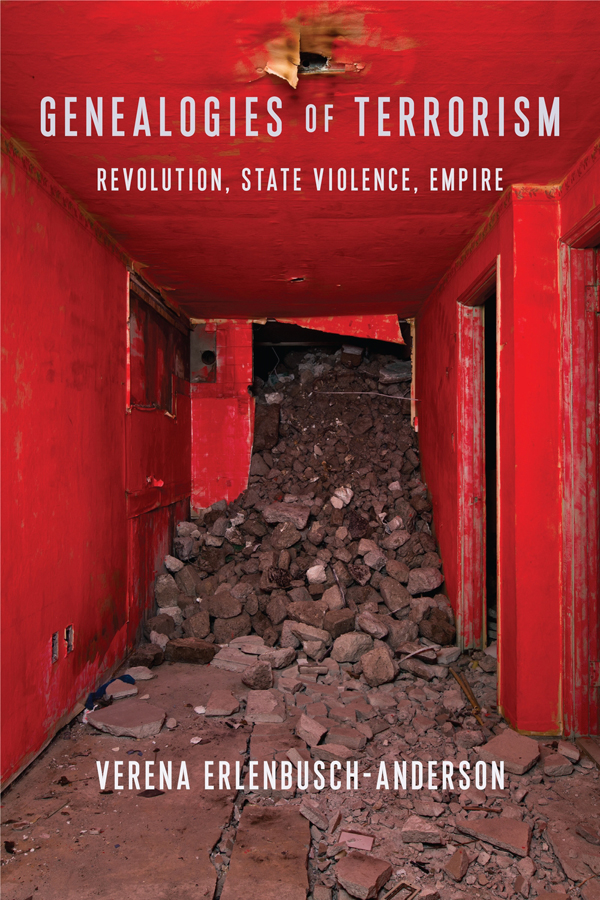Contents
Guide
Pagebreaks of the print version
GENEALOGIES OF TERRORISM
GENEALOGIES OF TERRORISM
REVOLUTION, STATE VIOLENCE, EMPIRE
VERENA ERLENBUSCH-ANDERSON
Columbia University Press
New York

Columbia University Press
Publishers Since 1893
New YorkChichester, West Sussex
cup.columbia.edu
Copyright 2018 Columbia University Press
All rights reserved
E-ISBN 978-0-231-54717-8
Library of Congress Cataloging-in-Publication Data
Names: Erlenbusch-Anderson, Verena, author.
Title: Genealogies of terrorism : revolution, state violence, empire / Verena Erlenbusch-Anderson.
Description: New York : Columbia University Press, [2018] | Includes bibliographical references.
Identifiers: LCCN 2017053625 (print) | LCCN 2017057123 (e-book) | ISBN 9780231187268 (hardcover) | ISBN 9780231187275 (pbk.)
Subjects: LCSH: TerrorismSocial aspects. | TerrorismHistory.
Classification: LCC HV6431 (e-book) | LCC HV6431 .E744 2018 (print) | DDC 363.325dc23
LC record available at https://lccn.loc.gov/2017053625
A Columbia University Press E-book.
CUP would be pleased to hear about your reading experience with this e-book at .
Cover design: Chang Jae Lee
Cover image: Jung Jihyun, Demolition Site 01 Inside, 2013
FOR L, M, AND P

La premire tache de la libert, plus souvent conquise quacquise, est daller la longue qute du pass parce quil pse de tout son poids sur le prsent et que cest sur lui que lavenir se greffe.
Mouloud Mammeri
The allure of the archives entails a roaming voyage through the words of others, and a search for a language that can rescue their relevance. It may also entail a voyage through the words of today, with the perhaps somewhat unreasonable conviction that we write history not just to tell it, but to anchor a departed past to our words and bring about an exchange among the living. We write to enter into an unending conversation about humanity and forgetting, origins and death. About the words each of us uses to enter into the debates that surround us.
Arlette Farge, The Allure of the Archives
A critique is not a matter of saying that things are not right as they are. It is a matter of pointing out on what kinds of assumptions, what kinds of familiar, unchallenged, unconsidered modes of thought the practices that we accept rest.
Michel Foucault, Practicing Criticism
CONTENTS
T his book has been a long time in the making, and I have incurred many debts along the way. At the University of Salzburg, Professor Clemens Sedmak made me love philosophy. Professor Theodor W. Khler introduced me to the world of archives and taught me how to read carefullyin medieval Latin shorthand writing, no less. Without the mentorship of Professors Michaela Strasser and Sonja Puntscher Riekmann, I would have never pursued a career in academia. The unwavering support of Professor Heinrich Schmidinger allowed me to pursue graduate work under exceptional conditions thanks to a prestigious DOC Fellowship from the Austrian Academy of Sciences. I owe them all much more than they know.
At the University of Sussex, Gordon Finlayson and Darrow Schecter taught me to think and write in a language and discipline in which I am only now beginning to feel more at home. Bill Scheuerman and Tarik Kochi provided invaluable feedback that made this book conceivable. I am thankful to Tom Akehurst, Chris Allsobrook, Szu-hung Fang, Andrei Gmez-Surez, Phil Homburg, Shamira Meghani, Simon Mussel, Chris OKane, Miguel Rivera, Katya Salmi, Gunjan Sondhi, Nadine Voelkner, and Yuliya Yurchenko for their friendship and intellectual companionship. I had the great fortune of reading Foucaults lectures with Tom Flynn at Emory University. For his generosity and care, both as a scholar and mentor, I remain profoundly grateful. For making a wonderful semester at Emory University possible, I thank Colin McQuillan and John Stuhr, as well as Gordon Finlayson.
This book has been made possible by an incredible community of friends and colleagues. I owe a particular debt to Colin Koopman, whose own work and engagement with mine have created the space in which what I do becomes possible and meaningful. For making me think harder, more clearly, and more fearlessly and for always being there, I am deeply grateful. To be able to think and write alongside Mary Beth Mader truly is a dream come true. Her genius, guidance, unwavering support, and, above all, friendship have been formative for my intellectual and personal development. I am also thankful for a wonderful friendship with the brilliant Maia Nahele, whose generosity, intellectual and otherwise, has been a source of inspiration. I thank Andrew Dilts for being an amazing friend and interlocutor. His insight on questions of method, reading practice, and activist scholarship has been invaluable not only for writing this book but also for my thinking about the role of theory in political struggles. My deepest thanks are due also to Mathias Thaler, whose clarity of thought and writing I hope one day to emulate and whose perspicacity and encouragement helped me tie this project together.
For their happy refusal of disciplinary border policing and their steadfast commitment to philosophical pluralism, I thank my colleagues at the University of Memphis: Luvell Anderson, Stephan Blatti (now at the University of Maryland), Remy Debes, Shaun Gallagher, David Gray, Bill Lawson, Mary Beth Mader, Mike Monahan, Tom Nenon, Hoke Robinson, Tim Roche, Kas Saghafi, Lindsey Stewart, John Tienson, Deb Tollefsen, and Somogy Varga. I am grateful to have experienced the warmth and wisdom of Pleshette DeArmitt; I miss her greatly. For taking such good care of me, I thank Connie Diffee and Cathy Wilhelm. I am grateful to current and former students at the University of Memphis for their curiosity and antidogmatism. Special thanks go to Bilge Akbalik, George Andrews, Shouta Brown, Lorena DeFrias, Josh Dohmen, B. Tamsin Kimoto, Jordan Liz, Chris Lucibella, Alberto Bejarano Romo, and James Zubko, as well as Skipper Boatwright, Robert Bowden, Allison Escobar, Chimene Okere, and Hunter Rhodes.
I am grateful to my fellow genealogists and to the speakers at the 2016 Spindel Conference for generously sharing their work, trying out ideas, and helping me think through hard problems of method and archival practice. Thanks to Amy Allen, Natalie Cisneros, Stuart Elden, Simon Ganahl, Rob Gehl, Stephanie Jenkins, Ladelle McWhorter, Thomas Nail, Kevin Olson, Brad Stone, Tuomo Tiisala, and Perry Zurn. I thank Tobias Klass for discussions of French philosophy during an unusually pleasant Memphis fall and for reading an early draft of the manuscript. Audiences at the University of Memphis, the University of Oregon, the California Roundtable on Philosophy of Race, the 2016 ECPR Joint Session in Pisa, the Critical Genealogies Workshop, and the 2016 Graduate Student Summer Institute in Rhetoric and Public Culture at Northwestern University provided critical feedback on various parts of this project. I thank all of them, and especially Penelope Deutscher, Dilip Goankar, Matthias Kaelberer, Alexander Livingston, Mihaela Mihai, Sharon Stanley, Mathias Thaler, and Yves Winter. I greatly benefited from discussions with Gerry Berk, Nicolae Morar, Chris Penfield, and Dan Rosenberg in a workshop on Colin Koopmans current project, and I thank the students in Colins Data Genealogies seminar and participants in a workshop on what is now of this book for their exceptionally thoughtful engagement with my work.


